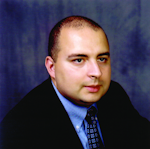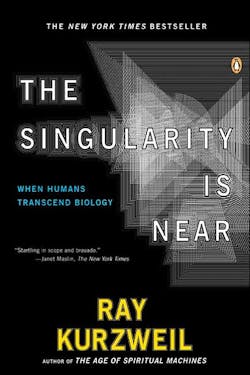Several months back I read an article on a leadership program that General Electric (GE) created in the 1970s. GE worried that its executives lacked a broad view of society or even life itself. GE needed more employees capable of guiding the company rather than following instructions or responding to obvious crises. They focused on a liberal arts oriented program. This reminded me of something an old history teacher would say to me time and time again.
“A well-trained man knows how to answer questions, but an educated man knows what questions are worth asking.”
It was with this belief they formed a partnership with a well known university to create a training program in which executives read and discussed the great books of the past, studied architecture, and went to museums.
I have thought how little time any of us has to reflect on what questions are worth asking, look broader, and think deeply.
With humanistic studies in mind, I have asked a diverse group of industry thinkers, CEOs, and entrepreneurs what writing has had a huge impact on them, and that they would recommend to others. What they sent back was a diverse and intriguing collection of writings that is bound to stir the soul and challenge the mind.
Following are their recommendations.
John Micthell Jr., President, Treat America
'The Singularity is Near' by Ray Kurzweil
A few years ago, I was discussing the future of vending with my friend Anant Agrawal of Cantaloupe Systems. We were imbibing and lamenting our mutual frustration with the slow pace of technological adoption in the vending industry, at which point Anant suggested I pick up a copy of "The Singularity," by Ray Kurzweil. Anant expressed hope that if I read the book I might better understand the evolution of technology and thus I might conclude that by embracing technological change (he preferred Cantaloupe's) I could create an advantage for my company. He said he thought that "The Singularity" would help me see things in a different light. Wow! Was Anant ever right!
The book’s central thesis is that the continuation of Moore’s law combined with extreme miniaturization of mechanical devices (nanotechnology) will drive exponential societal change, and that within this generation, humanity will evolve by literally merging with technology. (Yes – it took me a while to wrap my head around that concept!)
The book is technical and somewhat repetitive, but it convincingly details the arguments that support the conclusion. After reflecting on "The Singularity," it became clear to me that technology could indeed be the catalyst to re-energize my company and the vending industry. Today, I am a disciple of "The Singularity." (There is an annual conference for those who follow this book's ideas, but I don’t anticipate attending.) I have moved my company into the clouds (could computing), purchased an I-Pad, and I am eagerly awaiting the day when "nanobots" can be implanted in my brain so that I can finally remember people’s names. Oh, and in case you are wondering, no, I was never a Trekkie.
Dr. Ronald Cichy, Director and Professor, The School of Hospitality Business at Michigan State University
'Into the Silent Land' by Martin Laird
I just finished reading "Into the Silent Land" written by Martin Laird, O.S.A, a monk at St. Monica'e Priory in London. It is a guide to the Christian practice of contemplation. The author notes that we are all built for contemplation, and his book is about the skills necessary for entering the land of silence within, through disposing ourselves to surrender. The practice of silence positions us to allow something to take place, through our stillness and awareness.
In silence, you hear. It is easy to silence the noise externally - shut off your radio while driving, sit on a beach, as examples - however, it is extremely difficult to silence the voice within. That is the voice that tells us what we did wrong or what we did not do. We are our own worse critics. Contemplation attempts to free us from this negative voice, connect us with a new and heightened level of awareness, and encourages us to hear what we do not typically hear. It is a practice that takes a lifetime.
One of the quotes attributed to Mark Twain in Laird's book was a source of contemplation for me: "I am an old man now and have had a great many problems. Most of them never happened."
Heidi Chico, President, The Wittern Group
'The Carrot Principle' by Adrian Gostick and Chester Elton
I always enjoy reading books that focus on accelerating growth in business and the steps they focus on to achieving their goals. This book focuses on the human factor and how good leaders inspire their employees through recognition and motivation. This book is comprehensive and provides a road map of execution. It is a quick read and it is well worth it.
One of the principle concepts of this book is focusing on recognition. As leaders do, we should recognize our employees’ efforts on a regular basis.
Do we focus on the positive or the negative attributes of our employees? When was the last time you thanked your employees? This book states that there was a global workforce study from Towers Perrin that has found that 86 percent of the world’s employees are not willing to go the extra mile for their employers. Is this because of lack of recognition? This intrigued me.
I thought I would test the theory by asking one of my associates to go the extra mile with no recent recognition of his hard work. My employee couldn’t find enough time in the day to complete the task. He said that his department was over worked and under staffed. I knew that I wasn’t going to get the result I was looking for, so I decided to thank him for his efforts in another recent project. I also recognized his efforts among his peers. The next day, I asked him about completing this task. He went the extra mile, and completed the task on time.
As we all know, it’s the employees and their dedication that makes a company and their products great. As executives, we need to thank them more often. This book just emphasizes techniques on how to motivate.
Jon Ford, NCE5, President, All State Mfg.
'When Pride Still Mattered' by David Maraniss
As for my selection, I would recommend a biography of football coach Vince Lombardi by David Maraniss, called "When Pride Still Mattered." It's one of the best biographies ever written.
The author movingly weaves the tale of one of the most famous football coaches ever. If you finish this book and are unmoved by his story, his leadership and his love of the game, then there could be something wrong with you. You don't have to enjoy football to enjoy this book. Lombardi was a flawed man coaching an imperfect game, but he squeezed every drop of blood, sweat and tears from his life. And that is to be admired.
“Contrary to the opinion of many people, leaders are not born. Leaders are made, and they are made by effort and hard work,” said Vince Lombardi. When I read the above quote, my idea of leadership changed and I have used his ideas on leadership to develop my staff.
Like Coach Lombardi, my staff and I have come to believe in doing simple things with consistent excellence and practicing in a concise and intense matter. For example, we cross train many of our positions so an assembler learners to fabricate and a painter learns to assemble. We do this one week a month so each employee has time to practice throughout the year. We also allow our employees two days a month to develop an idea they may have. This effort put forth by our employees has resulted in a number of new products and much more manufacturing efficiency.
Here's hoping you find time to read a few of these selections. Or at the very least, find time now to suggest your favorite writing to others.
About the Author
Jon Ford, NCE, is president of All State Manufacturing Co. (www.allstatemfg.com), a manufacturer of metal coffee, vending and foodservice equipment. He is a director of the Indiana Vending Council and the Indiana Manufacturers Association. He can be reached at 800-274-2428.

Jon Ford
Jon Ford, NCE, is president of All State Manufacturing Co. (www.allstatemfg.com), a manufacturer of metal coffee, vending and foodservice equipment. He is a director of the Indiana Vending Council and the Indiana Manufacturers Association. He can be reached at 800-274-2428.






